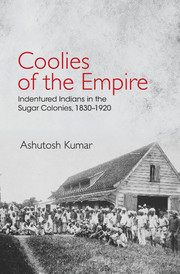Book contents
- Frontmatter
- Dedication
- Contents
- List of Figures and Maps
- List of Tables
- Preface
- Abbreviations
- Maps
- 1 Introduction: Indentured Emigrants in the Literature
- 2 Naukari, Network and Indenture
- 3 Regulating Indenture
- 4 The Journey
- 5 Agriculture and Culture between Two Worlds
- 6 Writing the Girmitiya Experience
- 7 The End of the Indenture System
- 8 Conclusion
- Appendices
- Glossary
- Bibliography
- Index
5 - Agriculture and Culture between Two Worlds
Published online by Cambridge University Press: 28 February 2018
- Frontmatter
- Dedication
- Contents
- List of Figures and Maps
- List of Tables
- Preface
- Abbreviations
- Maps
- 1 Introduction: Indentured Emigrants in the Literature
- 2 Naukari, Network and Indenture
- 3 Regulating Indenture
- 4 The Journey
- 5 Agriculture and Culture between Two Worlds
- 6 Writing the Girmitiya Experience
- 7 The End of the Indenture System
- 8 Conclusion
- Appendices
- Glossary
- Bibliography
- Index
Summary
Introduction
This chapter seeks to engage in a comparative analysis of the cultural worlds the indentured travelled between. For this, I shall look into north Indian peasant culture, to which the bulk of indentured labourers belonged, and then compare it to the culture under the plantation life of those indentured. To understand the culture of indentured labourers, who went to produce sugarcane and sugar in the colonies, it is necessary to understand both the process of sugarcane production under a peasant system in north India and that under the plantation regime of monoculture of sugarcane in the colonies. This chapter shows how the culture of north Indian societies is tied to an agricultural calendar, but in the colonies, it was not. Culture is lived and reproduced in communities, but is crucially linked to ‘place’ and the exigencies of work and labour. As the process of production and time is central to the reproduction of culture, by analysing culture we can understand the continuity and change in the process of indenture. Previously, historians have looked at the culture of indentured labourers in relation to work and plantation regimes. In so doing, they have failed to consider the actual process of work under plantation, which is a key factor in production or reproduction of culture. While presenting the culture of both societies through colonial ethnographies, this chapter also examines the respective natures of colonial ethnographies in India and in the sugar colonies. It also emphasizes on how the colonial regime in India was very much particular to the cultural ethnography, but such an attitude was absent in the sugar colonies.
Agriculture and Culture in North India
The quotidian culture of Indian peasant life was based in agriculture. Various ceremonies, festivals, rites related to birth, post-birth, marriage, informal religion, families and tutelary deities have been associated with agricultural calendar. A detailed documentation of agricultural cultivation and peasants’ rituals can be found in the ‘archives of colonial knowledge’. As postcolonial scholars have long understood, nineteenth-century colonial India can be considered as an era of ‘colonial knowledge’ when information about every aspect of Indian society was meticulously gathered.
- Type
- Chapter
- Information
- Coolies of the EmpireIndentured Indians in the Sugar Colonies, 1830–1920, pp. 125 - 162Publisher: Cambridge University PressPrint publication year: 2017



